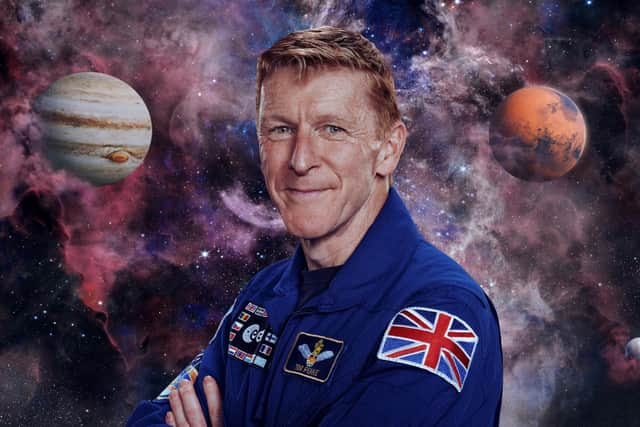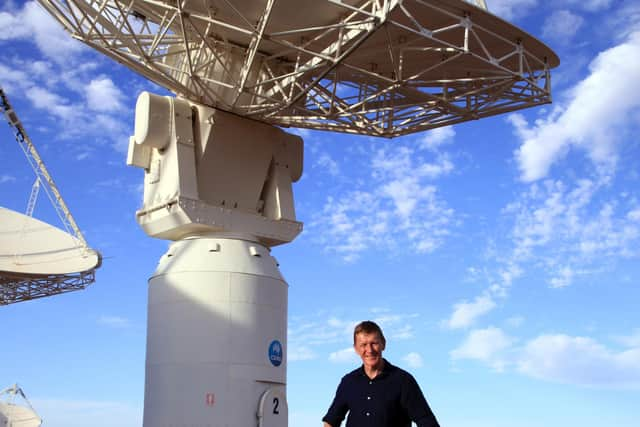Secrets of Our Universe: Astronaut Tim Peake on why space is scary and life beyond Earth
“There’s definitely life beyond Earth,” he says assuredly. This may, however, turn out to be micro-organisms rather than Martians. When we will find it, and where, is a more ambiguous question.
“Space is scary because it makes you realise that the vast majority of this universe is not hospitable at all,” muses the 51-year-old, who spent six months on the International Space Station.
Advertisement
Hide AdAdvertisement
Hide Ad“It’s trying to kill us. It’s a really nasty place. It’s empty. It’s a vacuum. The temperatures will kill you, the pressure will kill you, the radiation will kill you. And what it really tells you is Earth is not scary, Earth is our little oasis of life.


“But was I scared in space? Not really. I found it a very, very tranquil, serene environment to live and work in. There were a few scary moments on the docking that didn’t go well and we had an emergency on the spacewalk, but I wouldn’t say I was scared because we’ve already dealt with the fear. We trained it out of us.”
A new Channel 5 factual series, The Secrets of Our Universe With Tim Peake, launches on Tuesday, and deals with everything from black holes to stars and space missions.
Learning about the other planets in our solar system can teach us about our own, and its possible futures. “Why did Venus end up in a greenhouse gas runaway situation?” asks Peake. “Why did Mars get stripped of its atmosphere and stripped of its ocean?
Advertisement
Hide AdAdvertisement
Hide Ad"Where we can learn about what’s happened to other planets, we can use that as a cautionary tale about how to manage our own planet.”


In December 2015, Peake became the first British astronaut to visit the International Space Station. Peake conducted a spacewalk to repair the Station’s power supply, whilst other highlights of his mission saw him drive a rover across a simulated Mars terrain from space and help to dock two spacecraft.
"Spacewalking is amazing. It’s another order of magnitude,” he reflects. “It’s phenomenal being inside the space station.
"But then when you drop out of the airlock and you go on a spacewalk, that sense of freedom you have just floating in a spacesuit outside the space station and looking down at Earth, is unbelievable. It’s mind-blowing.”
Being in space gave him a whole new perspective.
Advertisement
Hide AdAdvertisement
Hide Ad“The moment you see Earth from space, you see the blackest black you’ve ever seen. We never see the colour black here on Earth because there’s always too much light around.
"True black sucks your soul out. Then against this backdrop of black, you’ve got this incredibly stunning Earth with its blue, its white clouds, green forests and orange deserts. It’s the most stunning planet you can imagine.
“But it also makes you realise that space is very intimidating. And this is our home and this is why we need to look after it. It’s the one place we can live.”
Peake took part in more than 250 scientific experiments during his mission, which also focussed on educational outreach, engaging more than two million schoolchildren across Europe in over 30 projects during his time in space.
Advertisement
Hide AdAdvertisement
Hide Ad"We explore space for a number of different reasons,” he says. “One is scientific research. And one is our innate curiosity, our desire to explore and push boundaries and find out what’s beyond the horizon.
"But we’re not exploring space in order to run away from Earth,” adds Peake, saying he does not subscribe to ideas of moving to another planet. “If we look after Earth we’ve got another billion years to go. There’s life left in the old girl yet.
We just need to be very clever about what we do. That’s why I’m a huge fan of science and technology. If we use it correctly and responsibly it can help solve many of the challenges we have on Earth.
"We’re faced with a changing environment, a growing population, a lack of resources. So we need to be clever and work together, and I think the space industry is all of those things.
Advertisement
Hide AdAdvertisement
Hide Ad"It has been clever, it has worked together, it has managed across difficult political boundaries to get people to collaborate – and will continue to do so.
"So rather than this doomsday approach of let’s go to Mars because Earth’s doomed, I think let’s explore space because it’s going to teach us how to live on Earth.”
Peake is confident there is life in the universe beyond Earth.
"What is interesting is as we become more developed, as our technology improves, our chances of seeing signatures from other planets and star systems are increasing.
Advertisement
Hide AdAdvertisement
Hide AdWe’ve been reasonably technological, intelligent human beings for not even the blink of an eye on a cosmological timescale. Our galaxy could be teeming with life. And there are still very good reasons as to why we haven’t found it.
"In terms of microbial life, we could potentially find out relatively soon, in the next 15, 20 years, if there may have been life on Mars.
"We’re starting to really probe the surface of Mars now and we’re starting to send probes to Jupiter and Saturn where there are liquid oceans beneath them.
“That would be amazing. If life has originated in one or more planet in our own solar system, that changes the parameters as to how we think about life elsewhere in the galaxy and universe.”
The Secrets of Our Universe With Tim Peake starts on Channel 5 on September 19.